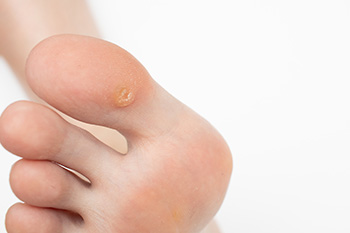
A plantar wart is a small, rough growth that appears on the bottom of the foot, caused by the human papillomavirus, or HPV, infecting the skin through tiny cuts or abrasions. Common causes include walking barefoot in public areas, such as near pools, or in locker rooms or showers, where the virus thrives. Symptoms may include a small, thickened area of skin, extreme pain while walking or standing, and sometimes black dots within the wart. Preventing plantar warts involves keeping feet clean and dry, avoiding direct contact with contaminated surfaces, and wearing protective footwear in public spaces. A podiatrist can diagnose plantar warts, provide safe treatment options, and offer guidance to prevent recurrence. If you have concentrated foot pain while standing or walking, it is suggested that you consult a podiatrist who can provide an accurate diagnosis and treatment.
Plantar warts can be very uncomfortable. If you need your feet checked, contact one of our podiatrists from Garnet & Carbonell, DPM, LLC. Our doctors will assist you with all of your foot and ankle needs.
About Plantar Warts
Plantar warts are the result of HPV, or human papillomavirus, getting into open wounds on the feet. They are mostly found on the heels or balls of the feet.
While plantar warts are generally harmless, those experiencing excessive pain or those suffering from diabetes or a compromised immune system require immediate medical care. Plantar warts are easily diagnosed, usually through scraping off a bit of rough skin or by getting a biopsy.
Symptoms
- Lesions on the bottom of your feet, usually rough and grainy
- Hard or thick callused spots
- Wart seeds, which are small clotted blood vessels that look like little black spots
- Pain, discomfort, or tenderness of your feet when walking or standing
Treatment
- Freezing
- Electric tool removal
- Laser Treatment
- Topical Creams (prescription only)
- Over-the-counter medications
To help prevent developing plantar warts, avoid walking barefoot over abrasive surfaces that can cause cuts or wounds for HPV to get into. Avoiding direct contact with other warts, as well as not picking or rubbing existing warts, can help prevent the further spread of plantar warts. However, if you think you have developed plantar warts, speak to your podiatrist. He or she can diagnose the warts on your feet and recommend the appropriate treatment options.
If you have any questions, please feel free to contact our offices located in Palmetto Bay, South Miami, and Homestead, FL . We offer the newest diagnostic and treatment technologies for all your foot care needs.
